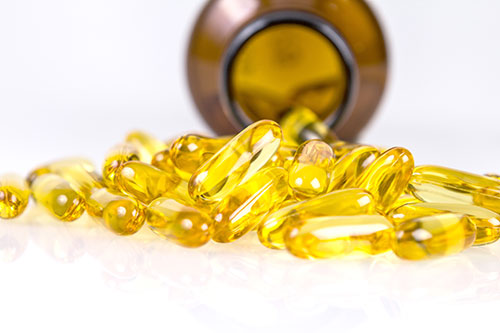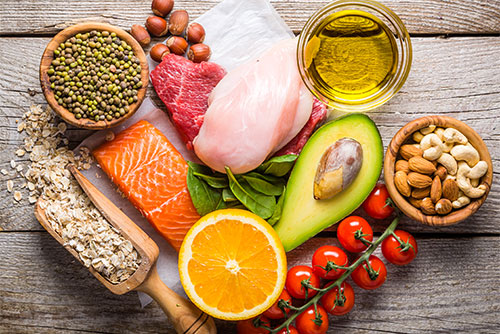Alternative medicine
Overview
Complementary and alternative medicine is a topic currently under much discussion. Are these treatments effective or harmful? Here is what we have found on this subject. It’s up to you to discuss it with your doctor to figure out which treatment is best for you.
PROCURE disclaimer

This website provides information on complementary and alternative medicine. We are not a substitute for your doctor or other health professionals. PROCURE encourages you to consult your doctor regarding any decisions concerning your treatment or care. Your doctor or another health professional should be monitoring any treatments that may affect your physical or psychological health. PROCURE may not be held liable for treatments, products, or services mentioned on this site.
What are we talking about
Complementary and alternative medicine refers to “diverse medical and health care systems, practices, and products that are not generally considered part of conventional medicine […]” (– National Centre for Complementary and Alternative Medicine (NCCAM), 2015). These treatments are not generally considered part of conventional medicine or mainstream approaches.
While often used interchangeably, alternative therapies are very different from complementary treatments.
To help you tell them apart, the following definitions can be found listed below: traditional medicine, complementary medicine, alternative medicine, and integrative medicine.
Traditional medicine (conventional) — medical or surgical treatments that are accepted and practiced within the Canadian healthcare system. These research‑based treatments are both effective and safe.
Complementary treatments — these treatments are used together with or at the same time as conventional treatments. Commonly used to alleviate side effects of traditional treatments.
Alternative treatments — treatments used in place of conventional treatments.
Integrative treatments — combining conventional and complementary treatments has been scientifically shown to be both safe and effective.
Complementary therapy
The various therapies

Relaxation techniques such as massotherapy, acupuncture, meditation, and even laughter can have extremely positive effects. Such methods can boost your immune system, relieve pain, reduce stress hormones, and lower blood pressure.
The same is true of yoga. Yoga promotes relaxation and improves your quality of sleep during treatment.
Certain complementary therapies are better suited for some situations, for example:
- Men undergoing hormone therapy who want to reduce their risk of cardiac disease, diabetes, and bone loss
- Men undergoing chemotherapy who want to alleviate side effects such as pain or nausea
- Men who need help decreasing side effects of surgery or radiation therapy such as loss of bladder control
Results
Research results
Research has shown that a number of complementary therapies can be used safely alongside conventional cancer treatments.
Their benefits
Some people feel that using a complementary therapy help to give them a sense of control and the feeling of being more involved in their health care. Other people believe that complementary therapies help to improve their quality of life.
Develop your own program
If your cancer treatment centre does not offer complementary therapies, nothing is stopping you from creating your own integrated program by contacting competent professionals in your community.
Alternative therapy
It is important to note the following

Research in alternative therapies have not been shown to be effective and safe in treating cancer. Using alternative therapies while delaying or refusing conventional treatments can have serious health consequences including the growth of cancerous tumours or the spread of cancer to other parts of the body.
For the many people who already use alternative medicine, the lack of scientific knowledge behind these therapies may pose a risk or cause adverse reactions because of incorrect dosages, improper product use, or drug interactions between two treatments.
Why you embark…
Alternative medicine is not about medicine or surgery. Many people are turning away from conventional medicine because they fear the operating table or the side effects of drugs. In contrast, alternative medicine is attractive because it is not like conventional treatments that often cause harm to patients. Alternative medical treatments are usually less risky and less likely to cause direct harm.
Alternative therapies are like wishful thinking. Within the ranks of alternative practitioners and their clients, ideas without any scientific basis are like magic tricks. Some people reject conventional medicine simple because it isn’t magic. Sometimes medicine looks like it works miracles, but these miracles are based on science, not faith.
Remember that unlike complementary treatments, alternative treatments are used as a replacement for other prostate cancer treatment options.
Manipulative body therapies

There are many different manipulative body methods available. Where they are offered, whether the individuals offering them are qualified, and whether the methods will be of any benefit, is impossible for PROCURE to assess. We encourage you to speak with your doctor first.
Acupuncture
Acupuncture as a therapeutic intervention originated from the medical practices of the Chinese and other Asian cultures. Traditional Chinese Medicine uses acupuncture to regulate the flow of “vital energy”. The technique consists of inserting thin needles through the skin at specific points on the body to control pain and other symptoms. Acupuncture may provide relief from side effects of orchiectomy (removal of the testes). Studies also support the use of acupuncture to alleviate nausea associated with chemotherapy and for the pain that often occurs when cancer has spread beyond the prostate (particularly to the bones).
Ayurvedic medicine
Central to Ayurvedic philosophy is the notion that optimal health consists of physical, mental, and spiritual harmony. Ayurveda is an ancient holistic system of medicine from India that uses a constitutional model. Its aim is to provide guidance regarding food and lifestyle so that healthy people can stay healthy and folks with health challenges can improve their health. This understanding that we are all unique individuals enables Ayurveda to address not only specific health concerns but also offers explanation as to why one person responds differently than another to illness and treatment. Treatment may include dietary modification, herbal preparations, massage, yoga, meditation, and breathing exercises.
Chiropractic
Chiropractic is based on the importance of the role that the nervous system plays in both involuntary and voluntary bodily functions and the principle that proper spinal column position is necessary for optimal health. Chiropractors treat a wide variety of conditions with spinal manipulation. While some medical controversy surrounds this method, some patients report that chiropractic is useful for them.
Bioenergetics therapy
Bioenergetics therapy involves psychotherapy, relaxation techniques, and therapeutic touch to relieve muscle tension. It uses a combination of psychotherapy, gentle body movements, massage, deep breathing, and exercises. The technique may also incorporate aspects of traditional Chinese medicine, biofeedback, herbal medicine, homeopathy, and nutrition. There is no scientific evidence that bioenergetics therapy is effective to treat cancer. However, some patients report that bioenergetics therapy is useful as a relaxation method.
Biofeedback therapy
Biofeedback is a technique to improve health by learning to control consciously certain physiological bodily processes, such as heart rate, blood pressure, muscle tension, perspiration, and skin temperature. Guided by a biofeedback therapist and the use of monitoring devices, a person can learn to lower his tension through relaxation techniques and mental exercises.
Bioelectromagnetic-based therapies
Bioelectromagnetic-based therapies involve the unconventional use of electromagnetic fields, such as pulsed fields, magnetic fields, or alternating current or direct current fields, to treat conditions such as asthma or cancer, or manage pain and migraine headaches. Magnetic fields are generated by the use of such items as magnetic pads, magnetic bandages, magnetic jewellery and magnetic mattresses. A pulsed magnetic field involves applying an appropriate electrical current to affect human body tissues. There has not been enough research to determine the effectiveness of these bioelectromagnetic-based therapies.
Exercise
Exercise is recommended regularly, especially aerobic, because it temporarily increases testosterone and also helps to maintain a healthy weight.
Massage
Massage represents the manipulation of muscle and connective tissue to enhance function of those tissues and promote relaxation and well-being. Massage can reduce stress and boost immune function, so it may help ease anxiety for men undergoing treatment for prostate cancer.
Naturopathy
Naturopathic medicine trusts in the healing power of nature and uses a variety of approaches – oriental, physical, homeopathic, botanical, among others – to help the body heal itself. According to naturopathic philosophy, health is a composite of physical, emotional, mental, and spiritual well-being. Some patients report that naturopathy is useful for them.
Osteopathy
Osteopathic practice rests on the notion that the mechanical structure of the body is inherently linked to its function and is the most important factor in maintaining health. Manual manipulations are done to correct the structural problem. Several patients report that osteopathy is helpful.
Reflexology
The early Indians, Chinese and Egyptians were first to practice this art. It is believed that reflexology can be used to restore and maintain the body’s natural equilibrium and encourage healing by applying gentle pressure to the feet. Tensions are eased, and circulation and elimination is improved. Reflexology is said to relax a patient while stimulating the body’s own healing mechanisms. A foot massage and a massage of the whole hands with a massage roller twice per day, a few minutes for each foot and hand can be done.
Psychological therapies
 This section treats therapies involving primarily mental processes. As with all other therapies, we encourage you to consult your doctor first.
This section treats therapies involving primarily mental processes. As with all other therapies, we encourage you to consult your doctor first.
Cognitive-Behavioural Therapy
This therapy, also called supportive counselling, involves techniques to help people gain a sense of motivation, better acceptance, and enhanced self-esteem. The first task is to evaluate which factors and behaviours may have a negative effect on coping mechanisms. Once these have been identified, the therapist and patient work together on behavioural answers. The role of the clinician is one of support, acceptance, and facilitation of interaction.
Humour Therapy
Laughter therapy is used as an emotional release and to reduce stress. Of course, humour can be a delicate matter and it has to be appropriate – you won’t always feel like laughing. But there are many demonstrated benefits, and has helped many people. Laughing has physiological effects: it can lower blood pressure, reduce stress hormones, increase muscle flexion, boost immune function and also release endorphins, the body’s natural painkillers which produce a general sense of well-being. If using all of the body’s energy to concentrate on cancer, it can block therapeutic interventions of both medical and CAM treatment. Using laughter can help to strengthen human energy and achieve a greater sense of inner peace.
Hypnosis
Hypnosis is an artificially induced condition, resembling profound sleep, marked by subconscious activity and sensitivity to suggestion. This intervention has been found useful in the treatment of cancer pain.
Imagery
Imagery or visualization is the language that the mind uses to communicate with the body. A person’s mind can learn to direct and control images and can help his body to heal itself. Imagery can be used to help relieve pain and to control hundreds of ailments. Visualization and other relaxation methods have shown that they may produce significant benefits –often by helping to ease pain.
Meditation
Meditation is a safe and simple way that can help balance a person’s physical, emotional, and mental states. The focus of meditation is to quieten the busy mind. The intention is to direct your concentration to one healing element – a sound, word, image, or breath. Meditation may confer benefit by helping to reduce stress and anxiety, and regain a sense of self-control. There are various types of meditation – prayer is probably the best known, but there is also transcendental meditation, mindfulness meditation, Zen, Buddhist, and Taoist meditation, among others.
Music Therapy
Music or sound therapy is a method that consists of the active or passive use of music to promote therapeutic effects and improve quality of life. This intervention can involve guided imagery, and can lower heart rate, blood pressure, and breathing rate. In cancer patients who have had chemotherapy, research found that music therapy resulted in reductions in levels of pain and nausea.
Relaxation
The main objective of relaxation exercises is to calm the mind and to reduce emotional tension through muscle relaxation. It can be useful in assisting the patient to relax muscles, get better blood flow to a painful part, as well as to decrease anxiety. Several techniques may be used, such as progressive muscle relaxation, rhythmic breathing, and guided imagery.
Spiritual Practices
A very old healing tradition, such practises involve asking favours and interventions from a spiritual source – God or spirit – to participate in healing the sick. Studies have found that spirituality is very important to the quality of life for some people with cancer. The psychological benefits can include reduction of stress and anxiety, promotion of a more positive attitude, and the reinforcement of the will to live.
Support and Self-Help Groups
A support group can provide patients with support and hope can help patients and families look beyond the diagnosis, cope with treatment, and start living life once again. For more information about support groups, see our section on support groups.
Natural therapies
 Aromatherapy
Aromatherapy
Aromatherapy involves treatment using scents, in the form of essential oils (extracts or essences) from flowers, herbs, and trees. These aromas are thought to promote health and well-being. The technique is widely used for a variety of applications, including relieving pain caused by the side effects of chemotherapy.
Herbs and plants
Many classifications of herbs exist according to their different effects: for example, herbs may have anti-inflammatory, antispasmodic, antimicrobial or hypotensive property. They can be adaptogenic herbs (increase resilience and resistance) or tonics (supportive of vital energy). Herbal preparations may be given for ingestion as teas, capsules or tablets, or as extracts or tinctures. Herbal preparations may also be used topically, as when they are made into balms or ointments.
Homeopathy
Homeopathy was developed in the late 18th century by Samuel Hahnemann, a respected doctor in Germany. This therapy is based on the principle that a patient can be cured by an infinitesimal dose of a substance which, in a healthy individual, causes the same effects as the disease to treat: it is the ‘law of similarity’. Homeopathic preparations are based on a mixture of active ingredients that are gradually, but highly diluted. At the end of this dilution cascade, only a few molecules of active ingredient remain in the final preparation. The current homeopathy uses a thousand different remedies. The vast majority of the few clinical tests on the effectiveness of homeopathy are inconclusive. It would seem that the placebo effect plays an important role. The debate remains open, however. Homeopathy, however, has the advantage of providing drugs that do not cause undesirable side effects.
Vitamins and Supplements
Eating well starts with eating a variety of foods every day in order to get all the essential nutrients to stay healthy. Instead of taking supplements, try meeting your nutritional needs by eating healthy food. This section warns you about the dangers of supplements and gives you all the information you need to make an informed decision.
The role of vitamins

Vitamins are essential nutrients that must be taken every day. The vitamins you get from what you eat and drink must be enough to meet your daily needs. Most people are able to get enough vitamins to meet their needs by following the guidelines outlined in Canada’s Food Guide and eating a variety of healthy foods.
The two most common vitamins
There are two types of vitamins: water-soluble vitamins and lipid-soluble vitamins.
Water-soluble vitamins:
Vitamins B1, B2, B3, B6, and B12, vitamin C, biotin, and folate. They are not stored in large amounts in the body, and any extra is lost through your urine.
Lipid-soluble vitamins:
Vitamins A, D, E, and K. These vitamins can be stored in your body. High amounts of fat-soluble vitamins are not recommended, as they can cause health problems.
What vitamins are in what food? The following table will help you understand why it is important to get enough of some of the common vitamins and lists the best food sources of these vitamins.
Vitamin – Function – Food Sources
Vitamin B1 (Thiamin)
Helps with energy production in your body.
Sources – Whole grains, enriched grains, liver, pork, dried beans, nuts and seeds.
Vitamin B2 (Riboflavin)
Helps with energy production in your body. Helps your body use other B vitamins.
Sources – Soybeans, meat and poultry, liver and eggs, mushrooms, milk, cheese, yogurt, whole grains, enriched grains.
Vitamin B3 (Niacin)
Helps your body to use protein, fat, and carbohydrates to make energy. Helps enzymes work properly in your body.
Sources – Mushrooms, peanut butter, meat, fish, poultry, whole grains, enriched grains.
Biotin
Allows your body to use protein, fat, and carbohydrates from food. Biotin content in food can vary greatly.
Sources – Sweet potatoes, non-fat milk, yogurt, peanuts, almonds, eggs, liver, soy protein.
Vitamin B6 (Pyridoxine)
Helps your body to make and use protein and glycogen, which is the stored energy in your muscles and liver. Helps form hemoglobin, which carries oxygen in your blood.
Sources – Bananas, 100% bran, instant oatmeal, meat, fish, poultry, liver, soybeans, chickpeas, lentils, pistachio, nuts, sunflower seeds.
Vitamin B12 (Cobalamin)
Works with vitamin folate to make DNA. and helps to make healthy blood cells. Low levels of vitamin B12 can cause a type of anemia. Keep nerves working properly.
Sources – Milk, cheese, yogurt, fortified soy or rice beverages, meat, fish, poultry, liver, eggs, fortified soy products.
Folate
Folate is the folate that is found in vitamin supplements. Helps to produce and maintain DNA and cells. Helps to make red blood cells and prevent anemia. Found in vitamin supplements and fortified foods.
Sources – Asparagus, cooked spinach, romaine lettuce, brussels sprouts, beets, broccoli, corn, green peas, oranges, orange juice, bread, enriched pasta, wheat germ, liver, dried beans, soybeans, chickpeas, lentils, sunflower seeds, flax seeds.
Vitamin C
May help prevent cell damage and reduce risk of certain cancers, heart diseases, and other diseases. Helps heal cuts and wounds and keeps gums healthy. Protects you from infections and keeping your immune system healthy. Increases the amount of iron your body absorbs from some foods.
Sources – Citrus fruits such as oranges, grapefruits, and their juices, kiwi, strawberries, mangoes, papaya. red, yellow, and green peppers, broccoli, brussels sprouts, tomatoes, raw dark leafy vegetables.
Vitamin A
Helps you to see during the day and at night. Protects you from infections by keeping skin and other body parts healthy. Promotes normal growth and development.
Sources – Liver, some fish, milk, cheese.
Carotenoids (Aapha, betacarotene, et betacryptoxanthin)
Carotenoids are not vitamins but some types can turn into vitamin A in the body. Act as antioxidants, which protect your body from damage caused by harmful molecules called free radicals.
Sources – Cantaloupe pink grapefruit, tomatoes, broccoli, dark green leafy vegetables like spinach, beet greens, and swiss chard, dark orange vegetables such as carrots and sweet potatoes.
Vitamin D
Increases the amount of calcium and phosphorus your body absorbs from foods. Deposits calcium and phosphorus in bones and teeth, making them stronger and healthier. Protects against infections by keeping your immune system healthy.
Sources – Milk, fortified soy, and rice beverages, fortified margarine, some fish, eggs, organ meats, fish liver oils.
Vitamin E
Helps to maintain a healthy immune system and other body processes. Acts as an antioxidant and protects cells from damage.
Sources – Vegetable oils, avocados, leafy green vegetables, wheat germ, sunflower seeds, some nuts, peanut butter.
Vitamin K
Make proteins that cause our blood to clot, when you are bleeding. Involved in making body proteins for your blood, bones, and kidneys.
Sources – Broccoli, soybeans, dark green leafy vegetables such as kale, collards, turnip/beet greens and spinach.
Dietary supplements and cancer

What are they
Examples include preparations made from vitamins, minerals, plants, or antioxidants that are available over the counter without a prescription in pharmacies, large stores, or over the internet. Many people use them to stay healthy and sometimes in the hopes of preventing the development of cancer.
Not without medical supervision
We suggest that you do not take supplements unless you have medical supervision. Your doctor may prescribe supplements for you if he finds a deficiency, usually for vitamin D, or in the event of specific medical indications.
A Dutch survey revealed that 40% of the population used some sort of dietary supplement. However, the World Cancer Research Fund International (WCRF) strongly advises against it as their protective effect have not been proven and dietary supplements can have unexpected side effects.
Other study results
Several studies have even shown an increased risk of developing certain cancers after taking high doses of multivitamin supplements and/or antioxidants.
- Studies done on smokers to test the supposed protective effect of betacarotene, a compound our body converts to vitamin A, were stopped prematurely as patients began developing lung cancer after taking high doses of betacarotene supplements (20mg/day).
- Retinol, a compound the body converts from betacarotene, is also suspected to promote the development of cancer when taken in high doses (25,000 IU/day). Large doses of folate (>0.4 mg/day for more than 5 years) can also promote the development of certain cancers like prostate cancer.
- A similar connection was made linking high doses of vitamin E (400 IU/day) with an increased risk of developing prostate cancer.
Use caution when taking dietary supplements! Always ask your doctor, pharmacists, or dietician before.
Prioritize healthy foods

No supplement beats a healthy diet. A varied diet, rich in fruits, vegetables, and other plant-based foods is much better for your health than dietary supplements.
A Swiss study of over 70,000 people over the course of 13 years has shown longer survivability and lower overall mortality when participants ate at least 5 servings of fruits and vegetables a day.
Myth versus Reality
Vitamin E, Selenium, and prostate cancer
Vitamin E and selenium have long been thought to have protective effects when it comes to prostate cancer.
An American research team has shown that selenium and vitamin E supplements, even at a low dosage, increase the risk of developing prostate cancer if taken when there is no proven deficiency.
The SELECT study
An earlier study, called the Selenium and Vitamin E Cancer Prevention Trial (SELECT), conducted on 35,000 men showed that taking selenium and vitamin E does not protect against prostate cancer.
Further research revealed that not only do dietary supplements not have a protective effect, taking large doses of selenium (200 mcg/day) and vitamin E (400 IU/day) significantly increases the risk of developing a more aggressive advanced prostate cancer.
Surplus calcium and vitamin D deficiencies
There is more and more proof that vitamin D deficiencies play a role in prostate cancer development. Some evidence suggests that there is a link between vitamin D deficiencies and an increased risk of prostate cancer.
Because of Canada’s northern latitude, the sun’s rays are weaker in the fall and winter. We recommend that Quebecer adults consider taking a vitamin D supplement.
Conclusion: Ask your doctor for advice
Avoid high doses of vitamin or mineral supplements because they can help increase the risk of prostate cancer. Instead of consuming supplements, try to meet your nutrient needs by eating healthy foods.
Note that it has not been shown that taking supplements containing antioxidants such as beta-carotene, vitamin E or selenium could offer protection against prostate cancer. In fact, vitamin E may increase the risk of developing prostate cancer.
The risks increase if you take vitamin E and selenium when your body does not need it.
Taking dietary supplements is never harmless. A well-balanced diet is normally enough to meet your body’s needs.
It is important to talk to your doctor before taking supplements rich in vitamins, trace elements, and minerals.
We are here for you
You have questions or concerns? Don’t hesitate. Contact us at 1-855-899-2873 to discuss with one of our nurses specialized in uro-oncology. They are there to listen, support and answer your questions, and those of your family or your loved ones. It’s simple and free, like all of our other services.
Also take the time to visit each of our pages on this website, as well as our YouTube channel, in order to get familiar with the disease, our expert lectures, our section on available resources, the support that is offered to you, our events and ways to get involved to advance the cause.
Staying Informed
Pages that might interest you
Want to know more? Just click on one of the links below.
The latest PROCURE news that might interest you
Every week we publish a blog article. Here are some we have chosen for you.
- Did you say prostate cancer?
- I want to postpone my treatment… Is that wise?
- I have several treatment options… Which one to choose?
The medical content and editorial team at PROCURE
Our team is composed of urologists, and nurses certified in uro-oncology with a deep knowledge of prostate cancer and other diseases related to the genitourinary system. Meet our staff by clicking here.
Sources and references
- Prostate Cancer – Understand the disease and its treatments; Fred Saad, MD, FRCSC and Michael McCormack, MD, FRCSC, 4th et 5th editions
- Canadian Cancer Society
- Prostate Cancer Foundation-PCF.org
- National Cancer Institute-USA
- American Cancer Society
- Memorial Sloan Kettering Cancer Center
- Prostate Cancer UK
Last medical and editorial review: April 2023
Written by PROCURE. © All rights reserved


